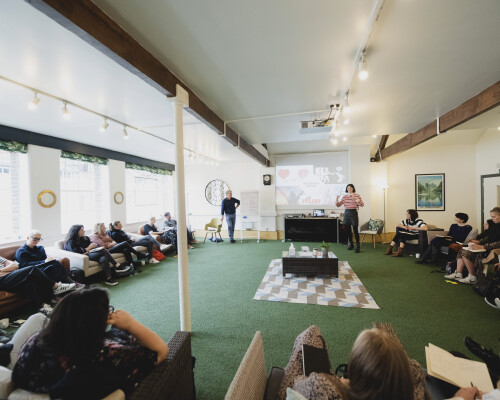Whether you’re an established senior leader, or anticipating an Executive Level role in the future, it’s always a good time to think about how you embed inclusion and diversity into your company culture.
In order to rigorously challenge personal biases and tokenism, many leaders are seeking to demonstrate their commitment to DEI by taking steps beyond introductory workshops.
The aim is to drive behavioural change across their organisations, with measurable results in wellbeing, talent retention and productivity. But where to begin?
Before creating new dialogues and initiatives with colleagues, it begins with YOU, as leader. How can you honestly assess your own effectiveness in the area of inclusive leadership?
Why does DEI matter to you?
It’s undeniable that an inclusive culture has ethical, societal and indeed commercial benefits.
But in order to be a protagonist and role model for change, you need to feel aligned with this work and willing to make a personal commitment. So how will this journey benefit you?
- The traits that you develop will actually influence your leadership style as a whole. These include empathy, self-awareness and a growth mindset where you are continually learning and adapting.
- Remaining curious as a leader and open to feedback will promote innovation and effective problem solving. It also means you won’t be working in a silo or echo chamber, operating from a place of privilege and presumption, surrounded by ‘yes people’. It supports you in challenging Affinity Bias and GroupThink.
- Not only does inclusion work connect you to people with a different lived experience, it’s also a great opportunity to help you think beyond your immediate specialism and status. This approach is essential for effective senior leadership, which involves an awareness of all operations and strong networking skills. Being a high-performing ‘Head Of’ might get you to the C-Suite, but these traits of awareness and relationship-building will actually prepare you for it.
- DEI work also prepares you to lead in an increasingly diverse and multicultural work landscape, which might include overseas markets, remote colleagues and a multi-generational workforce.
- Committing to this work also signals your personal brand values – and shows people the kind of leader you are, or intend to be. This will be signalled not only through words, but consistent behaviours over a longer period of time.
When should you assess your Inclusive Leadership style?
Your overall aim is to create everyday inclusion, and a continuous improved experience for your colleagues, customers and stakeholders – so any time is a good time to start thinking about these issues.
But as far as your personal development is concerned, it’s a good time to review your inclusive leadership style when…
- You are crafting a 3-5 year plan towards Executive level.
- You are anticipating a new C-suite role in the near future.
- You’re in the first 90 days of a new C-suite role.
- You’re an established senior leader who wants to create cultural change in the organisation.
You will feel a lot more confident in communicating these values and disseminating them throughout the organisation if you have done the self-reflective work first. So it’s better to get ahead of the curve, before you are in the thick of a new role with its many demands and battling priorities.
Whether you aspire to senior leadership or are nurturing those who do, creating a culture of inclusion means that the future Executive Team will be more diverse – not only demographically, but diverse in thinking styles and specialisms.
What will change for you personally?
Inclusion work will also prompt a change in attitudes and beliefs, and help you shift from unconscious to conscious incompetence. If you ‘know what you don’t know’, then you can begin to create a learning and development plan for yourself, to increase your personal self-awareness and to initiate change in your organisation.
How can you challenge your current mindset around inclusion?
- Learn about different types of Cultural intelligence (our research will help with that).
- Take the Harvard Implicit Association Test. This will really open your eyes!
- Begin a reverse mentoring programme, facilitated by experienced providers such as School for CEOs. Your mentor would be a junior colleague, perhaps from a different generation, cultural background or lived experience. As well as accelerating your personal development, it gives your colleagues a structured and safe space to share their viewpoints and suggestions.
- Take part in an Inclusive Leadership 360°, garnering anonymous feedback from several of your colleagues, who provide feedback on your inclusive leadership style. After the diagnostic, your coach will support you with agenda setting and focussed development.
- Use our ABC Model as a touchstone.
The School for CEOs ABC Model
Our Proprietary Model can be a constant reference point to keep you on track.
Accountability
Leaders who approach their roles with humility, recognise that they will make mistakes and are willing to accept and learn from them. Inclusive cultures are accelerated in organisations when leaders are prepared to hold others to account and allow people to call out their own behaviours if they are not inclusive.
Behaviour
Leader role modelling is the single most powerful lever in enabling organisational culture change. Leaders will set a powerful example by knowing and adopting behaviours that make others feel respected, valued, and supported to succeed at work.
Curiosity
Curious leaders develop heightened self-awareness. They are more aware of their personal biases, and how these impact their behaviour, and they are motivated to understand different cultures and how they come together. These leaders adjust their behaviour to their environment and have a growth mindset anchored in their curiosity.
Inclusive Leadership Checklist
- Follow the ABC Model
- Challenge your biases
- Increase your Cultural Intelligence
- Challenge GroupThink
- Break out of silos
- Stay curious, engaged and integrated with diverse experiences
- Invite feedback in a structured and psychologically safe way
- Enlist the help of a coach and/or reverse mentor!





